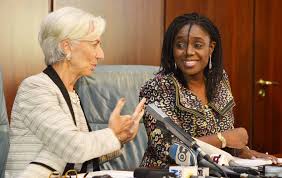The Minister of Finance, Mrs. Kemi Adeosun, has the former minister, Oby Ezekwesili, that President Muhammadu Buhari was wrong in her assessment of President Muhammadu Buhari’s economic policy as “archaic and opaque.”
Ezekwesili had said that the president is running a command and control economy which had failed before and would fail again.
But Adeosun, who spoke on Sunrise, a programme on Channels TV, disagreed.
According to her, the administration is running a planned economy with an eye on the diversification of the country’s economy, which had been a pipe dream for long.
“I don’t agree that we have a command and control economy. What we are trying to have is a planned economy. There must be some planning. We need to plan for the future and have an economy that meets the needs of Nigerians. We are a huge economy, so we shouldn’t have an economy where growth is not inclusive and allows a few people to prosper at the expense of others,” he said.
On the criticisms that have trailed the performance of the economy, Adeosun said the President Buhari’s Economic Team is doing everything to ensure that the economy is reflated and also to improve the lives of Nigerians. She said the economic team is competent, hard working and would turn the economy around
According to her, “There is an economic team. It is chaired and managed by the Vice President. I am a member. Others include the two ministers in the Budget and National Planning ministry, the Minister of Trade and Investment, the Minister of Information & Culture, Head of the Debt Management Office and the Director General of Budget, among others. So, there is an economic team. It is just a different structure from having a Coordinating Minister of the Economy (CME). Remember that under the CME system, Budget was under the Ministry of Finance. But Budget has now moved to National Planning.
“The economic blueprint is very clear. We are going to invest in capital projects to ensure that we diversify this economy. We have been talking about diversification since I was a child and we haven’t achieved that.”
On the priority focus of the administration, she said the primary goal of the government is revamping domestic production as part of efforts to diversify the economy.
“If we just feed ourselves rather than import food, we would create jobs and wealth”. We have a huge population, a huge land mass and what is missing perhaps, is unfortunately infrastructure. Let’s take something as simple as tomato paste as an example. “We import tomato paste from China, but we have tomatoes rotting in Kano. If we have rail and power, we can process and move these products, we can compete,” she said.
“As soon as the budget is signed, we are going to pump N350 billion into the economy in this quarter and we are going to do so every quarter until we stimulate growth. We will see growth if we spend money on those things that would create jobs.”
She made it clear that the people should expect quick fixes to the terribly-battered economy.
She said, “If you have cancer, you cannot take panadol, you have to take proper medication. It has to be done painstakingly.”
She said the drop in crude oil prices presented a good opportunity to reposition the economy, saying that the opportunity for diversification of the economy created by the crisis should not be wasted.
“Everybody is now extremely sober. Every Nigerian is sober. All the governors have realised that the oil price can plummet from $110 per barrel to $28 per barrel over such a short period of time and we could be so exposed that we cannot even pay salaries. So there is a sobriety that has come in and I don’t think we should waste this opportunity.” We are working very hard with the states and have told them that we need to have a fiscal restructuring plan. Any relief provided by the FG will be conditional on this. States must do biometric capturing of their staff; they must know who they are paying and put in efficiency units just as we have done at the FG level where we are seeing the level of significant savings that this can generate.
On the Sovereign Wealth Fund (SWF), she said what the FG wants to do is “reposition and have it focused in line with government’s objectives which is investments in infrastructure,” saying that the government realised that even with 30 per cent of the budget earmarked for capital spend, the country’s infrastructure gap is so wide that government alone cannot bridge it.
“So what we are hoping is that the sovereign wealth fund now becomes a channel to attract further private capital, particularly from investment funds abroad. We really want to focus on infrastructure – toll roads, bridges, power plants, things that would help the economy grow.”














